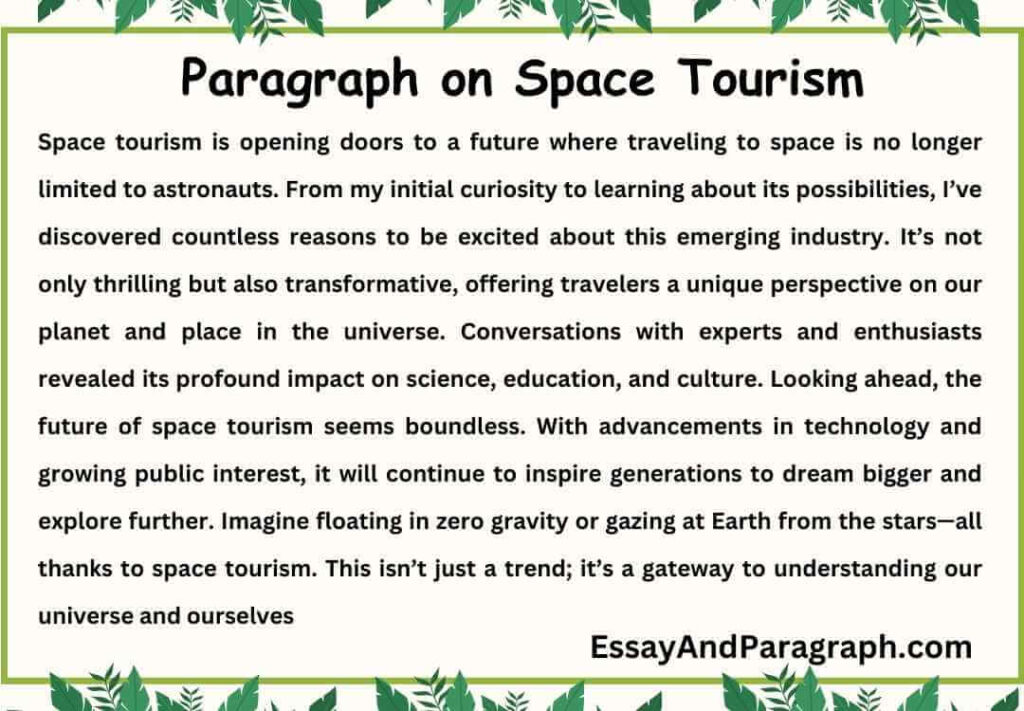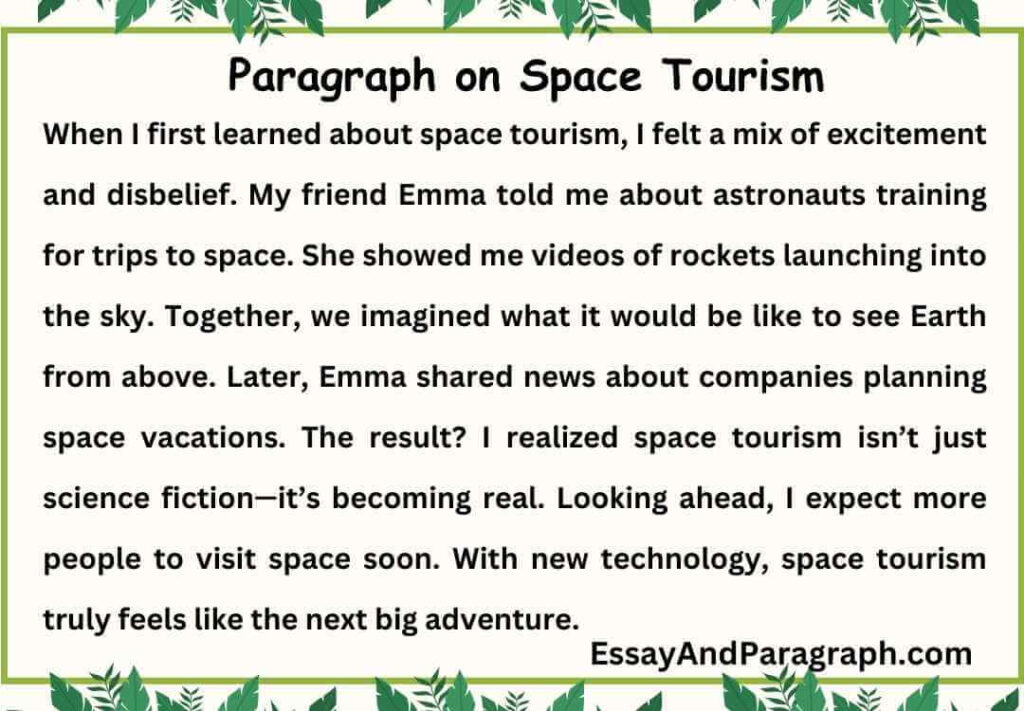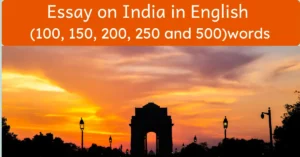Have you ever dreamed of floating among the stars or seeing Earth from space? Space tourism is turning this dream into reality for some lucky adventurers. When I first heard about space tourism, I was amazed by how far we’ve come in exploring the cosmos. As someone who loves learning about space, I’ve spent time researching and imagining what it would feel like to travel beyond our planet. In this article, we will learn how to write paragraphs on space tourism in different lengths (100, 150, 200, 250, 300 words). Whether you’re curious about its challenges or excited about its possibilities, this guide is here to help. Let’s blast off into the world of space tourism together!
Paragraph on Space Tourism [100 words]
When I first learned about space tourism, I felt a mix of excitement and disbelief. My friend Emma told me about astronauts training for trips to space. She showed me videos of rockets launching into the sky. Together, we imagined what it would be like to see Earth from above. Later, Emma shared news about companies planning space vacations. The result? I realized space tourism isn’t just science fiction—it’s becoming real. Looking ahead, I expect more people to visit space soon. With new technology, space tourism truly feels like the next big adventure.

Paragraph on Space Tourism [150 words]
The first time I thought about space tourism, I wondered if it was possible. To learn more, I watched a documentary featuring Richard Branson and Jeff Bezos. They talked about their dreams of sending people to space. Their passion made me want to know more.
Later, I discussed this with my teacher, Mr. Carter. He explained that space tourism involves special rockets and suits to keep travelers safe. “It’s not just for fun,” he said, “it helps us study space better.” His words stayed with me.
During class, we had a fun activity where we designed our own spaceships. Everyone got excited about the idea of traveling to space. By the end, I understood why space tourism matters. It inspires us to explore and learn.
Looking forward, I believe space tourism will grow quickly. More companies are working on safer and cheaper ways to send people to space. Someday, maybe even I’ll get to go!
Paragraph on Space Tourism [200 words]
When I first heard about space tourism, I couldn’t believe it was happening now. At a science fair, I met Sarah, an engineer who works on spacecraft design. She explained how rockets carry tourists to the edge of space. Her enthusiasm made me curious to try it someday.
Sarah invited me to watch a rocket launch video. Seeing the Earth from space looked breathtaking—like a giant blue marble surrounded by stars. Afterward, she introduced me to other engineers working on space tourism projects. One of them, Alex, shared stories about testing safety systems for travelers.
What amazed me most was how many people are involved in making space tourism possible. Scientists, pilots, and designers all work together to create unforgettable experiences. By the end of the day, I realized space tourism isn’t just about adventure—it’s also about teamwork and discovery.
Looking ahead, I’m hopeful that space tourism will become accessible to everyone. Companies are already finding ways to lower costs and improve technology. Imagine being able to take a weekend trip to space! With each step forward, space tourism brings us closer to understanding our universe—and ourselves.
Paragraph on Space Tourism [250 words]
My fascination with space tourism began when I attended a talk by a retired astronaut named Lisa. She described her journey to space and how it changed her perspective on life. Listening to her, I felt both inspired and curious. Could regular people like me ever experience something so incredible?
Lisa explained that space tourism allows non-astronauts to visit space for short trips. These journeys usually last a few minutes to hours, giving travelers a chance to float in zero gravity and see Earth from above. During the Q&A session, I asked her about the training required. She said it’s intense but worth it.
After the talk, I chatted with other attendees. A boy named Max shared his dream of becoming a space tourist. Another woman, Priya, mentioned how space tourism could inspire kids to study science. Their excitement reminded me of how powerful this idea is.
By the end of the event, I understood why space tourism is important. It’s not just about luxury—it’s about inspiring humanity to reach further. Governments and private companies are investing heavily in this field. In the future, I imagine space hotels and lunar vacations becoming common.
With advancements in technology, space tourism will open doors we can’t yet imagine. From exploring Mars to studying distant planets, it represents the beginning of a new era. Space tourism isn’t just a dream—it’s a stepping stone to the stars.
Paragraph on Space Tourism [300 words]
When I first encountered space tourism, I admit I thought it sounded impossible. How could ordinary people travel to space? Determined to find out, I visited a space exhibit hosted by a local museum. There, I met Dr. Patel, an astrophysicist who specializes in space exploration. His presentation on space tourism captivated me.
One highlight was learning about Virgin Galactic and Blue Origin—companies leading the way in space tourism. Dr. Patel explained how these companies use reusable rockets to reduce costs. He also showed footage of passengers experiencing weightlessness and gazing at Earth from space. It looked magical.
During lunch, I joined a group discussion with other visitors. A man named Tom shared how he saved up for years to book a ticket on a suborbital flight. Another attendee, Maria, talked about her hope that space tourism would encourage environmental awareness. Their stories highlighted the emotional impact of seeing Earth from space.
What struck me most was the sense of unity space tourism fosters. Travelers often describe feeling connected to all of humanity when they view our planet as one small part of the universe. By the end of the day, I realized space tourism wasn’t just about thrill-seeking—it was about perspective.
Reflecting on the experience, I see immense potential for space tourism. Innovators are already planning orbital hotels and missions to the Moon. As costs decrease and technology improves, I foresee widespread participation in the coming decades. With its ability to inspire wonder and curiosity, space tourism embodies progress. It’s not just about leaving Earth—it’s about discovering what makes us human.
FAQs on Space Tourism
What Is Space Tourism?
Space tourism refers to trips taken by non-astronauts to outer space. These journeys allow travelers to experience zero gravity and view Earth from space.
How Much Does Space Tourism Cost?
Currently, space tourism costs range from $250,000 to millions of dollars, depending on the company and type of trip. Prices are expected to drop as technology advances.
Who Can Go on a Space Tour?
Anyone in good health can apply, though rigorous training may be required. Age limits vary by company, but participants must pass medical tests.
Where Do Space Tours Happen?
Most space tours occur in suborbital regions near Earth. Some companies aim to offer trips to the International Space Station or the Moon in the future.
Why Is Space Tourism Important?
Space tourism inspires innovation, promotes scientific research, and encourages global interest in space exploration. It also creates jobs and drives technological advancements.
Will Space Tourism Be Affordable Soon?
As companies develop reusable rockets and scale operations, prices are likely to fall, making space tourism more accessible within the next decade.
Summary on Space Tourism
Space tourism is opening doors to a future where traveling to space is no longer limited to astronauts. From my initial curiosity to learning about its possibilities, I’ve discovered countless reasons to be excited about this emerging industry. It’s not only thrilling but also transformative, offering travelers a unique perspective on our planet and place in the universe. Conversations with experts and enthusiasts revealed its profound impact on science, education, and culture. Looking ahead, the future of space tourism seems boundless. With advancements in technology and growing public interest, it will continue to inspire generations to dream bigger and explore further. Imagine floating in zero gravity or gazing at Earth from the stars—all thanks to space tourism. This isn’t just a trend; it’s a gateway to understanding our universe and ourselves.











